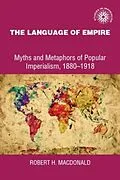The debate about the Empire dealt in idealism and morality, and both sides employed the language of feeling, and frequently argued their case in dramatic terms. This book opposes two sides of the Empire, first, as it was presented to the public in Britain, and second, as it was experienced or imagined by its subjects abroad. British imperialism was nurtured by such upper middle-class institutions as the public schools, the wardrooms and officers' messes, and the conservative press. The attitudes of 1916 can best be recovered through a reconstruction of a poetics of popular imperialism. The case-study of Rhodesia demonstrates the almost instant application of myth and sign to a contemporary imperial crisis. Rudyard Kipling was acknowledged throughout the English-speaking world not only as a wonderful teller of stories but as the 'singer of Greater Britain', or, as 'the Laureate of Empire'. In the last two decades of the nineteenth century, the Empire gained a beachhead in the classroom, particularly in the coupling of geography and history. The Island Story underlined that stories of heroic soldiers and 'fights for the flag' were easier for teachers to present to children than lessons in morality, or abstractions about liberty and responsible government. The Education Act of 1870 had created a need for standard readers in schools; readers designed to teach boys and girls to be useful citizens. The Indian Mutiny was the supreme test of the imperial conscience, a measure of the morality of the 'master-nation'.
Autorentext
Robert H. MacDonald
Klappentext
During the last thirty years of the nineteenth century the British Empire increased enormously and by 1900 the Empire covered a fifth of the world's land surface. In Britain itself, the growth of Empire came to the centre of the political debate and was applauded by a largely sympathetic press. Two sides of imperialism had emerged - the acquisition of territory and a campaign of propaganda to make imperialism 'popular'. Both are the subject of this book.The Language of Empire describes how the Empire was constructed and given shape and meaning for its contemporaries. The author explores how the imperial 'story' was imagined and how the day-to-day activities of its participants were understood. He focuses on both the face of Empire as it was presented to the public, and at the lives of individual imperial soldiers or adventurers, exploring how the idea of Empire gave meaning to the actions of its participants. The author defines the role of discourse in determining this perception of reality - looking at the construction of Empire though the huge body of popular texts ranging from fiction, poetry and children's stories to history and biography.This study will appeal to readers interested in British imperialism, those engaging in literature and cultural studies as well as to specialists in colonial history.
